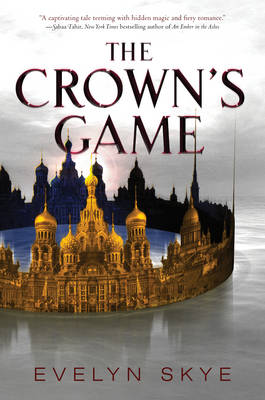Reviewed by Briana @ Pages Unbound on
Possibly one of the most difficult things for an author to achieve is making readers care about their characters, and it's certainly something Skye struggles with. Of course I feel bad that Vika or Nikolai is destined to die, but it's the type of "feeling bad" I'd have for any person in a sad situation. I did not care about them, or any of the characters, as individuals. I'm not entirely sure what Skye could have done to fix this, though I think showing readers more of what was at stake for the characters might have helped. Of course nobody wants to die, but beyond that, what matters to these characters? What do they lose if they die? If Skye had shown me more of what makes the characters tick or what they wanted to achieve in life, or shown me who would have been absolutely devastated if they lost and died, I might have cared more. I needed to feel there would be some emptiness or unfulfilled potential if one of these characters died.
The plot was somewhat more exciting than the characters, but some of it doesn't quite make sense, and the pacing is off. There are really two strains of plot going on, and Skye didn't quite reconcile them. The book wants to be dire and epic and deep, but it gets sidetracked by frivolous magic and flights of fancy. And, honestly, if the book had simply embraced frivolity, I think I could have really enjoyed it.
[Slight spoilers this paragraph.] Ostensibly Vika and Nikolai are dueling to the death. Their goal: impress the tsar with their magic and show him they have what it takes to be a royal advisor and also lead a upcoming war. What do they with their magic instead? Decorate St. Petersburg. Now, the book goes out of its way to assure readers that Vika and Nikolai are performing stunning, complex, difficult magic, that it takes enormous strength and power and concentration to do something like paint all the houses on a square or make a water fountain in a river. So, sure, I'll buy that. However. this takes place in a world where 1) few people believe in or know anything about magic and 2) the tsar started the Crown's Game because he fears a looming war. So 1) probably no one knows whether painting some houses complex magic or not and 2) it definitely doesn't have an immediate use in war. Of course, the book also has to come up with lots of convoluted to help the plot make sense (i.e. no one believes in magic, so the competitors can't do anything too dangerous or scary). However, this is still stupid because they could have just gone somewhere more isolated, and I think there's still a way to demonstrate you have warlike abilities that would be more effective than making magical puff pastries. The enchanters' training exercises that nobody saw were more to the point than the things they choose to do during the actual competition.
In terms of pacing, the book starts out slowly then goes on a mad dash at the end, complete with the classic "overdone drama between two characters motivated by a seemingly insignificant "event." I was not really a fan. The book then ends suddenly and kind of assumes readers will be on board for the next one, but I don't think I will be.
Usually I give 2 stars to books I actively dislike, but I'm giving 2 here instead of 3 mostly because I was just so bored the entire time I was reading it. I also considered DNF-ing several times, which is also a criterion I use to give lower ratings. There's a lot of potential in The Crown's Game, but it has a bit of an identity crisis over whether it's wants to be a book about beautiful magic or a book about war and danger and deceit. I would have loved a more frivolous take on this, I think, a book that just gloried in aesthetic magic and making St. Petersburg beautiful. I didn't really buy all the dire additions to the plot, however. This was one of my most anticipated reads of 2016, so I'm quite sad I felt so let down.
Reading updates
- Started reading
- 19 June, 2016: Finished reading
- 19 June, 2016: Reviewed
